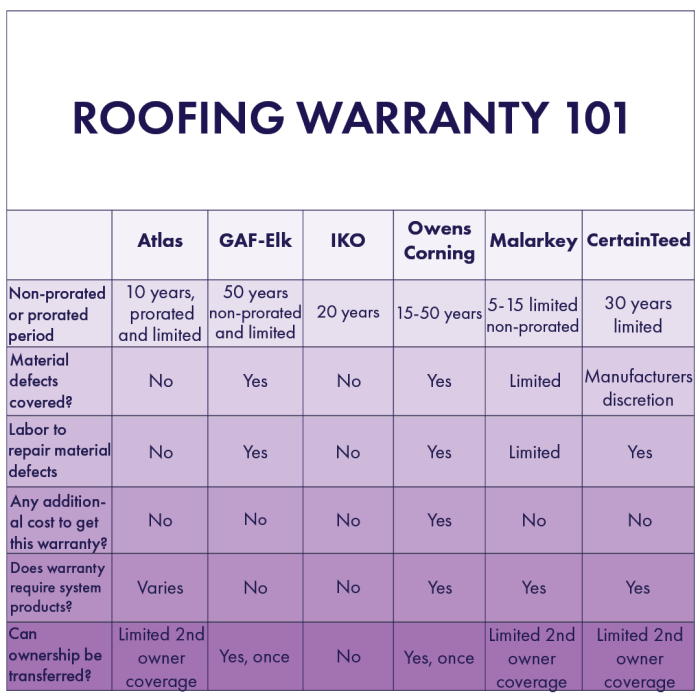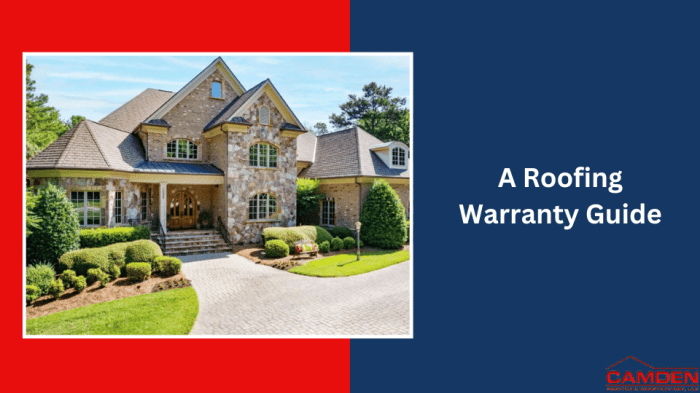Exploring the realm of roofing warranty options allows homeowners to make informed decisions regarding their roofing needs. From different types of warranties to the factors that influence their selection, this topic delves into the intricacies of protecting one's property with comprehensive coverage.
As we unravel the layers of roofing warranty options, readers will gain valuable insights into the nuances of choosing the right warranty for their specific requirements.
Types of Roofing Warranties
Roofing warranties are crucial for protecting your investment and ensuring peace of mind. There are different types of roofing warranties available in the market, each offering specific coverage and benefits.Manufacturer warranties typically cover defects in materials used for the roof.
These warranties are provided by the manufacturer of the roofing materials and usually have a limited duration, ranging from 10 to 50 years. They protect against issues like manufacturing defects, premature deterioration, or damage caused by weather conditions.On the other hand, contractor warranties focus on the workmanship of the installation.
These warranties are offered by the roofing contractor and cover issues related to the installation process, such as leaks or improper flashing. Contractor warranties usually have a shorter duration compared to manufacturer warranties, typically ranging from 1 to 10 years.Additionally, extended warranties can be purchased to provide even more comprehensive coverage.
These warranties combine both material and workmanship coverage, offering an extended period of protection beyond the standard warranties. Extended warranties can offer peace of mind for a longer period, ensuring that any potential issues with the roof are taken care of.
Material Warranties
Material warranties cover defects in the roofing materials themselves. They are typically provided by the manufacturer and protect against issues like premature deterioration, cracking, or curling of shingles. Material warranties usually have a specific duration and may vary depending on the type of roofing material used.
Workmanship Warranties
Workmanship warranties focus on the installation process of the roof. They are offered by the roofing contractor and cover issues related to the workmanship, such as leaks, improper flashing, or inadequate ventilation. Workmanship warranties ensure that the roof is installed correctly and protect against any installation-related problems.
Extended Warranties
Extended warranties combine both material and workmanship coverage, providing comprehensive protection for a longer period. These warranties can offer peace of mind beyond the standard manufacturer and contractor warranties, ensuring that your investment is well-protected for an extended duration.
Factors to Consider
When selecting a roofing warranty, the length of the warranty is a crucial factor to take into consideration. A longer warranty period typically provides more protection and peace of mind for homeowners. It ensures that any potential issues with the roof will be covered for an extended period, reducing the risk of unexpected repair costs.In addition to the length of the warranty, there are several key factors that should be considered before making a decision.
These factors include transferability, proration, and exclusions in roofing warranties. Transferability refers to whether the warranty can be transferred to a new homeowner if the property is sold. A transferable warranty can add value to the property and make it more attractive to potential buyers.Proration is another important factor to consider, as it determines how much of the warranty's cost will be covered by the manufacturer over time.
Some warranties may have a decreasing coverage percentage as the roof ages, so understanding the proration terms is essential to avoid any surprises in the future.Exclusions in roofing warranties Artikel specific conditions or situations that are not covered under the warranty.
It is crucial to carefully review these exclusions to understand what circumstances may void the warranty and what repairs or damages would not be covered.The climate and location of a property can also impact the choice of roofing warranty options.
Properties in areas prone to severe weather conditions such as hurricanes, heavy snowfall, or extreme heat may require a more comprehensive warranty that covers damages caused by these specific weather events. It is important to consider the local climate and environmental factors when selecting a roofing warranty to ensure that the roof is adequately protected.
Importance of Warranty Length
- Longer warranty period provides more protection and peace of mind for homeowners.
- Reduces the risk of unexpected repair costs.
Key Factors to Consider
- Transferability: Determine if the warranty can be transferred to a new homeowner.
- Proration: Understand how much of the warranty's cost will be covered over time.
- Exclusions: Review specific conditions or situations that are not covered under the warranty.
Impact of Climate and Location
- Properties in areas prone to severe weather may require a more comprehensive warranty.
- Consider local climate and environmental factors when selecting a roofing warranty.
Warranty Claim Process
When it comes to filing a warranty claim for roofing issues, there are specific steps you need to follow to ensure a smooth process. Additionally, providing the right documentation to support your claim is crucial in getting a favorable outcome.
In this section, we will discuss the warranty claim process, tips on documentation needed, and common reasons why roofing warranty claims may be denied.
Steps to File a Warranty Claim
- Contact the roofing manufacturer or contractor who provided the warranty to inform them about the issue.
- Provide details about the problem, including when it started and any relevant information that can help assess the situation.
- Schedule an inspection with the manufacturer or contractor to evaluate the roofing issue firsthand.
- If the issue is deemed to be covered under the warranty, the next steps for repair or replacement will be discussed.
- Ensure to keep communication records and documentation of all interactions related to the warranty claim.
Documentation Needed for a Warranty Claim
- Proof of purchase or installation of the roof, including receipts and contracts.
- Photos of the roofing issue to provide visual evidence of the problem.
- Any maintenance records or inspection reports to show that the roof was cared for properly.
- Copies of the warranty documents and any correspondence with the manufacturer or contractor regarding the issue.
Common Reasons for Denied Warranty Claims
- Failure to properly maintain the roof according to the manufacturer's guidelines.
- Roofing issues caused by improper installation or repairs done by unauthorized individuals.
- Exceeding the warranty coverage period or not meeting specific warranty requirements.
- Submitting incomplete or inaccurate information during the warranty claim process.
Maintenance Requirements

Maintaining your roof is crucial to uphold the validity of your roofing warranty. Neglecting regular maintenance can have serious implications on the coverage of your warranty. Here's a checklist of maintenance activities that homeowners should follow to ensure their roofing warranty remains valid.
Tasks for Maintenance
- Regular roof inspections to identify any damage or issues
- Cleaning gutters and downspouts to prevent clogging
- Trimming tree branches that may be hanging over the roof
- Checking for loose or missing shingles and replacing them promptly
- Ensuring proper attic ventilation to prevent moisture buildup
Last Recap

In conclusion, understanding the various aspects of roofing warranty options is key to safeguarding your investment and ensuring peace of mind for years to come. By considering factors such as warranty length, coverage details, and maintenance requirements, homeowners can navigate the complex landscape of roofing warranties with confidence.
Query Resolution
What factors should I consider when choosing a roofing warranty?
When selecting a roofing warranty, it's crucial to consider factors like warranty length, transferability, and exclusions to ensure comprehensive coverage for your property.
What are the common reasons for denial of roofing warranty claims?
Roofing warranty claims may be denied due to lack of proper documentation, neglect of maintenance tasks, or exceeding the coverage limitations Artikeld in the warranty terms. By staying informed and proactive, homeowners can avoid these pitfalls.
How does climate and location impact the choice of roofing warranty options?
The climate and location of a property play a significant role in determining the most suitable roofing warranty. Factors like weather conditions, exposure to elements, and regional considerations can influence the type of warranty that offers optimal protection for your roof.
What maintenance tasks are essential to uphold a roofing warranty?
Regular maintenance tasks such as roof inspections, gutter cleaning, and addressing minor repairs are essential to keep a roofing warranty valid. Neglecting these maintenance activities can jeopardize the coverage provided by the warranty.
























